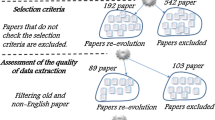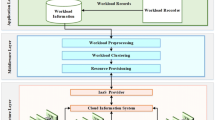Abstract
Cloud computing is an Internet-provisioned computing paradigm that provides scalable resources for the execution of the end user’s tasks. The cloud users lease optimal resources that meet their demands with minimum cost and time. The cloud service providers need high utilization of cloud resources and minimized execution cost. To achieve high user satisfaction and improve utilization of cloud resources, the task scheduling techniques should be resource and deadline aware and distribute the workload in a balanced manner. A number of heuristic and meta-heuristic-based task scheduling approaches have been proposed; however, the majority of these approaches are not resource and deadline aware. Moreover, these schedulers either optimize a single objective or multiple objectives with non-conflicting parameters. However, there is a need for schedulers that can provide a balanced solution for conflicting parameters like time and cost. In this paper, a modified and adaptive PSO-based resource- and deadline-aware dynamic load-balanced (PSO-RDAL) algorithm is proposed. The PSO-RDAL scheduling technique aims to provide an optimized solution for the workload of independent and compute-intensive tasks with reasonable time and cost. Moreover, the proposed approach also supports multi-objective-based optimization with conflicting parameters like time and cost. The experimental results reveal that the PSO-RDAL has gained up to 66%, 162%, 56%, 89%, 98%, and 97% enhancement in terms of makespan, average resource utilization, task response time, meeting task deadline, penalty cost, and total execution cost, respectively, as compared to existing state-of-the-art tasks scheduling heuristics.









Similar content being viewed by others
References
Hussain A, Aleem M, Khan A, Iqbal MA, Islam MA (2018) RALBA: a computation-aware load balancing scheduler for cloud computing. Cluster Comput 21(3):1667–1680
Sadashiv N, Kumar SD (2011) Cluster, grid and cloud computing: a detailed comparison. In 2011 6th International Conference on Computer Science and Education (ICCSE) (pp. 477-482). IEEE
Foster I, Zhao Y, Raicu I, Lu S (2008) Cloud computing and grid computing 360-degree compared. In 2008 grid computing environments workshop (pp. 1-10). Ieee
Calheiros RN, Ranjan R, Beloglazov A, De Rose CA, Buyya R (2011) CloudSim: a toolkit for modeling and simulation of cloud computing environments and evaluation of resource provisioning algorithms. Softw Pract Exp 41(1):23–50
Alaei N, Safi-Esfahani F (2018) RePro-Active: a reactive-proactive scheduling method based on simulation in cloud computing. J Supercomput 74(2):801–829
Kong L, Mapetu JPB, Chen Z (2020) Heuristic load balancing based zero imbalance mechanism in cloud computing. J Grid Comput 18(1):123–148
Adhikari M, Amgoth T (2018) Heuristic-based load-balancing algorithm for IaaS cloud. Future Gen Comput Syst 81:156–165
Mousavi S, Mosavi A, Varkonyi-Koczy AR (2017) A load balancing algorithm for resource allocation in cloud computing. Springer, Cham, pp 289–296
Zhang P, Zhou M (2017) Dynamic cloud task scheduling based on a two-stage strategy. IEEE Trans Auto Sci Eng 15(2):772–783
Nabi S, Ahmed M (2021) OG-RADL: overall performance-based resource-aware dynamic load-balancer for deadline constrained cloud tasks. J Supercomput 77:7476–7508
Chien NK, Son NH, Loc HD (2016) Load balancing algorithm based on estimating finish time of services in cloud computing. In 2016 18th International Conference on Advanced Communication Technology (ICACT) (pp. 228-233). IEEE
Kumar M, Sharma SC (2020) PSO-based novel resource scheduling technique to improve QoS parameters in cloud computing. Neural Comput Appl 32(16):12103–12126
Gogos C, Valouxis C, Alefragis P, Goulas G, Voros N, Housos E (2016) Scheduling independent tasks on heterogeneous processors using heuristics and Column Pricing. Future Gener Comput Syst 60:48–66
Kumar M, Sharma SC, Goel A, Singh SP (2019) A comprehensive survey for scheduling techniques in cloud computing. J Netw Comput Appl 143:1–33
Sharma G, Banga P (2013) Task aware switcher scheduling for batch mode mapping in computational grid environment. Int J AdvRes Comput Sci Softw Eng, 3
Deldari A, Naghibzadeh M, Abrishami S (2017) CCA: a deadline-constrained workflow scheduling algorithm for multicore resources on the cloud. J Supercomput 73(2):756–781
Mao Y, Chen X, Li X (2014) Max-min task scheduling algorithm for load balance in cloud computing. In Proceedings of International Conference on Computer Science and Information Technology (pp. 457-465). Springer, New Delhi
Panwar N, Negi S, Rauthan MMS (2017) Non-live task migration approach for scheduling in Cloud based applications. In International Conference on Next Generation Computing Technologies (pp. 124-137). Springer, Singapore
Kumar M, Sharma SC (2018) Deadline constrained based dynamic load balancing algorithm with elasticity in cloud environment. Comput Electr Eng 69:395–411
Torabi S, Safi-Esfahani F (2018) A dynamic task scheduling framework based on chicken swarm and improved raven roosting optimization methods in cloud computing. J Supercomput 74(6):2581–2626
Alkayal ES, Jennings NR, Abulkhair MF (2017) Survey of task scheduling in cloud computing based on particle swarm optimization. In 2017 International Conference on Electrical and Computing Technologies and Applications (ICECTA) (pp. 1-6). IEEE
Tawfeek MA, El-Sisi A, Keshk AE, Torkey FA (2013) cloud task scheduling based on ant colony optimization. In 2013 8th international conference on computer engineering & systems (ICCES) (pp. 64-69). IEEE
Chu SC, Tsai PW, Pan JS (2006) Cat swarm optimization. In Pacific Rim international conference on artificial intelligence (pp. 854-858). Springer, Berlin, Heidelberg
Hamad SA, Omara FA (2016) Genetic-based task scheduling algorithm in cloud computing environment. Int J Adv Comput Sci Appl 7(4):550–556
Senthilkumar SS, Brindha K, Agrawal NK, Vaidya A (2020) Dynamic Load Balancing Using Honey Bee Algorithm: Load Balancing. In Encyclopedia of Information Science and Technology, Fifth Edition (pp. 98-106). IGI Global
China KY, China QY (2016) A task scheduling based on simulated annealing algorithm in cloud computing. Int J Hybrid Inf Technol 9(6):403–412
Huang X, Li C, Chen H, An D (2020) Task scheduling in cloud computing using particle swarm optimization with time varying inertia weight strategies. Cluster Comput 23(2):1137–1147
Hussain A, Aleem M (2018) GoCJ: Google cloud jobs dataset for distributed and cloud computing infrastructures. Data 3(4):38
Chen SL, Chen YY, Kuo SH (2017) CLB: a novel load balancing architecture and algorithm for cloud services. Comput Electr Eng 58:154–160
Mishra SK, Khan MA, Sahoo B, Puthal D, Obaidat MS, Hsiao KF (2017) Time efficient dynamic threshold-based load balancing technique for Cloud Computing. In 2017 International Conference on Computer, Information and Telecommunication Systems (CITS) (pp. 161-165). IEEE
Yazdanbakhsh M, Isfahani RKM, Ramezanpour M (2020) MODE: a multi-objective strategy for dynamic task scheduling through elastic cloud resources. Majlesi J Electr Eng 14(2):127–141
Wang X, Yeo CS, Buyya R, Su J (2011) Optimizing the makespan and reliability for workflow applications with reputation and a look-ahead genetic algorithm. Future Gener Comput Syst 27(8):1124–1134
Zhang L, Chen Y, Sun R, Jing S, Yang B (2008) A task scheduling algorithm based on PSO for grid computing. Int J Comput Intel Res 4(1):37–43
Khalili A, Babamir SM (2015) Makespan improvement of PSO-based dynamic scheduling in cloud environment. In 2015 23rd Iranian Conference on Electrical Engineering (pp. 613-618). IEEE
Nabi S, Ahmed M, Ibrahim M, Jimenez JM (submitted) Particle Swarm Optimization based Task Scheduler in cloud Computing, Sensors Journal, MDPI
Kumar M, Sharma SC (2018) PSO-COGENT: cost and energy efficient scheduling in cloud environment with deadline constraint. Sustain Comput Inform Syst 19:147–164
Ibrahim M, Nabi S, Baz A, Alhakami H, Raza MS, Hussain A, Djemame K (2020) An in-depth empirical investigation of state-of-the-art scheduling approaches for cloud computing. IEEE Access 8:128282–128294
Ibrahim M, Nabi S, Hussain R, Raza MS, Imran M, Kazmi SA, Hussain F (2020) A comparative analysis of task scheduling approaches in cloud computing. In 2020 20th IEEE/ACM International Symposium on Cluster, Cloud and Internet Computing (CCGRID) (pp. 681-684). IEEE
Author information
Authors and Affiliations
Corresponding author
Additional information
Publisher's Note
Springer Nature remains neutral with regard to jurisdictional claims in published maps and institutional affiliations.
Rights and permissions
About this article
Cite this article
Nabi, S., Ahmed, M. PSO-RDAL: particle swarm optimization-based resource- and deadline-aware dynamic load balancer for deadline constrained cloud tasks. J Supercomput 78, 4624–4654 (2022). https://doi.org/10.1007/s11227-021-04062-2
Accepted:
Published:
Issue Date:
DOI: https://doi.org/10.1007/s11227-021-04062-2




